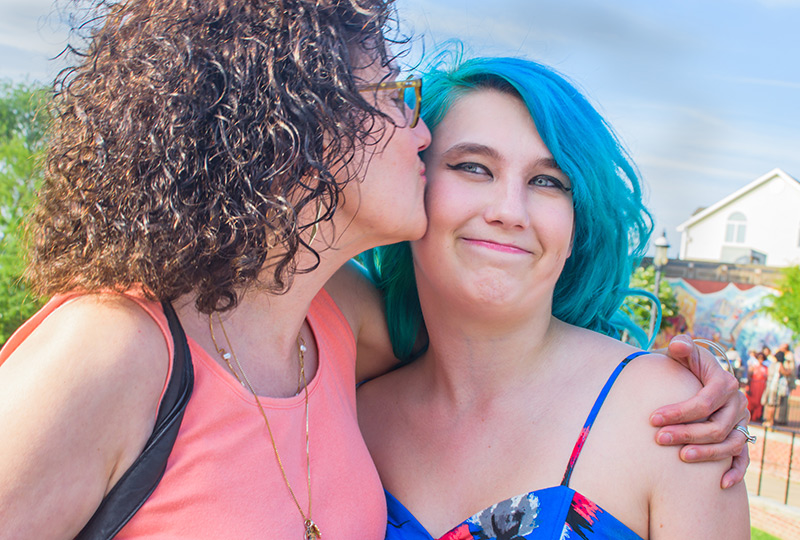If your teenager can’t stand being near you, remember: This is totally normal.
The first time my son broke my heart, he was 13.
I returned from my morning jog to spot him waiting for the school bus. I bounded up, hollered, “Hey, buddy! Have a good day!” and tried a high-five.
Son – standing beside another 8th-grader – went rigid, mumbled something like “uumphhmm” and bugged his eyes out of his head in an expression I now recognize as part terror, part mortification.
This from the same child who for the first four months of life wailed piteously if I put him down. I barely slept, moved or showered in those months, so desperate was my son’s need to cocoon in my arms.
I guess he got over it.
An expression of independence
That morning at the bus stop, I realized he’d hit the age when the very existence of his parents is a humiliation. Hurt and peeved, I also felt sheepish that I hadn’t detected the keep-Mom-at-arm’s-length signals before embarrassing him in public. Yes, just by wishing him a good day. (OK, maybe the high-five was too much. I didn’t know!)
I griped to my husband that if “have a good day” was excessive, Son was lucky I didn’t greet him my preferred way: wrapping my arms around him, ruffling his hair and gushing “I wuv you sooooo much, sweet pea!” Really, he had no idea how easy he’d gotten off.
That evening my husband and I dumped a heaping plate of guilt on our boy: “I gave birth to you, and you can’t say good morning?” “You will show your mother respect at all times!”
But that was the wrong reaction — and useless — as there have been many occasions since the bus stop encounter when the mere sight of me in a public place prompted Son to glaze over, avert his eyes and turn his back.
When your teenager is embarrassed by you, it stings, but take a deep breath. This is a normal part of teenagers’ transition from childhood to independence, which by definition means pulling away from you, often literally. Did you want your mom fawning all over you (read: standing next to you) when you were that age? Did you worry that at any second she was going to say something awful in front of your friends? (Guilty!)
“Separating from parents is a normal phase of adolescence,” said Mary E. Romano, M.D., M.P.H., an adolescent medicine specialist at Monroe Carell Jr. Children’s Hospital at Vanderbilt. “We want our adolescents to develop their own ideas, opinions and identities. Sometimes during the process there is an exaggerated separation and rejection of parental thoughts, ideas and even affection.” This typically peaks midway through the teen years, she said.
Your kid will reject you – but the rejection’s not total. If you allow your teenager to keep the distance he requires, at least in public, you’ll enjoy a far closer relationship at home.
“Even when they say they aren’t, your teenager is listening” to what parents say, Romano said. All that eye-rolling doesn’t mean you should stop talking with your teen — maybe just keep deep conversations private, when their friends are not present. “Other adults tend to have more importance (than parents) during this time, so having your teen engaged with other positive adult influences is important,” she said. Think teachers, neighbors, pastors. Parents can also turn to the pediatrician or primary-care provider to broach topics with teens that might be too touchy for a parent-child discussion.
If you’re concerned that your teen is too distant and uncommunicative, talk with the doctor. Your child’s primary-care provider can help assess whether he needs help or intervention. “Teens that have a sudden change in grades, appearance, appetite or weight may be communicating their distress in other nonverbal ways,” and may need medical help or counseling, Romano said. But most teens’ desire simply to keep parents at arm’s length is normal.
Affection and attention, on their terms
As my son moved through his teenaged years, I learned to let him initiate interactions when we were out in public. If he wanted to walk several yards ahead or behind me, I didn’t complain. If he didn’t want to talk within anyone else’s earshot, I tried keeping mum until we got in the car. And no touching! To him, even the briefest embrace was totally, epically horrifying.
This is not to say I tolerated rudeness. If I got eye-rolling or sass, he got reprimanded about manners, and if he was lucky I waited until we were in private to deliver the lecture — but sometimes he got it when his peers could overhear. It’s OK in my book to keep some distance, but it’s got to be respectful distance from both parties: No under-the-breath sarcasm, no forgetting to hold doors. And no ignoring other adults who strike up polite conversation with him. We had many talks (at home) about social skills and looking people in the eye when they speak. A teenager seeking to avoid interaction with his parents must still interact with the rest of the world.
Here’s the thing: Even on a grumbly, surly day, the moment we get home, Son almost always morphs back into my sweet, affectionate child. He smiles at me! He asks for hugs! Completely different kid from the one in public! It’s reassuring that our relationship is not damaged and dysfunctional; it’s just no longer in the blissful, I-want-to-be-near-you-all-the-time stage of early childhood.
My son doesn’t need absolute separation from me and his dad. He just needs doses of it, on his terms.
Has your teen embarrassed you by being embarrassed by you? How did you handle it?
Maura Ammenheuser is a web content producer for Vanderbilt University Medical Center. She has an 18-year-old son and 15-year-old daughter, and by the end of the day just wants a hug from her kids.





